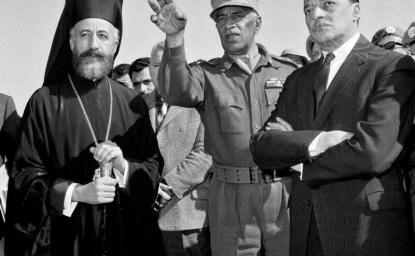Review by Ambassador William Green Miller (adapted from the September 2004 "Centerpoint" newsletter)
In the first of a series of conferences on the Iran-Iraq War (1980-1988), held on July 19, an illuminating discourse took place among government officials and diplomats from the United States and Europe, high UN officials, and others who were involved in significant ways during the course of the devastating war.
The backdrop of the Iranian Revolution of 1979 and the taking of U.S. diplomats from the embassy in Tehran as hostages set the stage for Saddam Hussein's decision to revoke the 1975 Algiers Agreement, which had established boundaries between Iran and Iraq. The powerful, spreading influence of Ayatollah Khomeini's revolutionary message already had aroused great apprehension in the region, particularly in the Arab world.
Documents assembled for this conference show how the relatively cautious, balanced approach of President Jimmy Carter in the final year of his administration gave way to a tilt of clear support for Saddam by the Reagan administration until the taking of hostages in Beirut led to the Iran-Contra episode, in which arms were sold to Iran. The most revealing pieces of evidence of this tilt are reports detailing Donald Rumsfeld's meetings with Iraqi Foreign Minister Tariq Aziz and Saddam in the midst of the war.
Conference participants directly involved at the time offered a gripping replaying of those critical events. Among the main topics discussed were the support for Saddam given by the Arab states-particularly Saudi Arabia-and the active support of the United States during the Reagan administration until the Iran-Contra episode, as well as the final years of stalemate.
Participants all added considerable detail about the interaction of the various governments who supported Iraq in the war and their changing attitudes about ending the war when it was clear that chemical weapons and the use of scud missiles would not bring about an end to the military stalemate.
The most compelling discussion concerned the complex twists and turns of diplomatic efforts taken at the UN which, in the end, successfully brokered a ceasefire and a close to the futile, bloody carnage of the eight years of war. Those who had funded and provided material support for the war were persuaded by skillful diplomacy to cut off any further financial or material support. The participants told a compelling story of how persistent diplomatic skill produced a wise outcome.
This conference made a valuable contribution to our knowledge about the tragic, still reverberating Iran-Iraq War, giving us insight into the present turbulence in the region.
For further information on the conference, see the conference report on this website (go to Links--CWIHP Conferences).
Related Links

Cold War International History Project
The Cold War International History Project supports the full and prompt release of historical materials by governments on all sides of the Cold War. Read more




